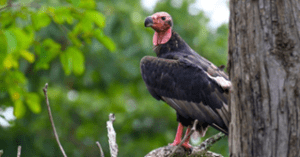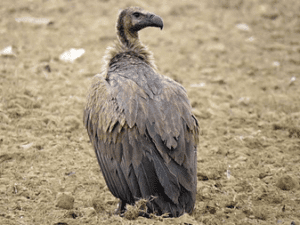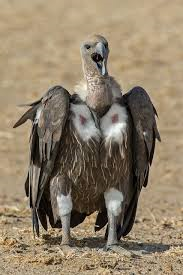TAG: GS 3: ECOLOGY AND ENVIRONMENT
THE CONTEXT: WWF-India has launched a significant initiative aimed at tracking and conserving vulture populations, often referred to as nature’s sanitation workers due to their role in maintaining ecological balance.
EXPLANATION:
- This initiative, known as Vulture Count 2024, will run from September 7 to October 6, coinciding with International Vulture Awareness Day.
- The campaign aims not only to count vultures but also to raise awareness about the critical importance of these birds to ecosystems.
The Ecological Role of Vultures
- Vultures play a crucial role in the health of ecosystems.
- By feeding on carrion, these birds prevent the spread of diseases that could potentially affect wildlife, livestock, and humans.
- Their scavenging activities contribute to nutrient cycling, helping to decompose animal carcasses and thus maintaining ecological balance.
- Without vultures, there would be a significant increase in decomposing animal remains, leading to a rise in diseases and environmental contamination.
Decline of Vulture Populations
- Despite their importance, vulture populations in India have suffered a dramatic decline over the years.
- Several threats have been identified as the primary causes of this decline:
- Ingestion of Toxic Substances:
- Vultures have been severely affected by non-steroidal anti-inflammatory drugs (NSAIDs), particularly diclofenac, which is commonly used to treat livestock.
- When vultures feed on carcasses of animals treated with these drugs, they suffer from kidney failure and die, leading to a significant drop in their numbers.
- Habitat Loss:
- As human populations expand, natural habitats are being encroached upon, reducing the areas where vultures can safely live and breed.
- Electrocution:
- Vultures are often electrocuted when they come into contact with power lines, a growing threat as more areas are electrified.
- Food Scarcity:
- Changes in livestock management practices and declining wildlife populations have led to a decrease in available food sources for vultures.
- Human Disturbances:
- Increased human activities, including urbanization and industrialization, have disturbed vulture habitats, making it harder for these birds to thrive.
- Ingestion of Toxic Substances:
Objectives of Vulture Count 2024
- The primary goal of Vulture Count 2024 is to systematically monitor vulture populations across India.
- By gathering comprehensive baseline data, the initiative aims to:
- Track Population Trends: Understanding how vulture populations are changing over time is crucial for assessing the effectiveness of conservation efforts.
- Identify Critical Habitats: By mapping where vultures are most commonly found, conservationists can focus their efforts on protecting these key areas.
- Assess Environmental Impacts: Analyzing how various environmental factors affect vulture populations will help in developing targeted conservation strategies.
- Raise Public Awareness: Engaging the public in vulture conservation efforts is essential for gaining widespread support and ensuring the long-term success of these initiatives.
Involvement of Volunteers and Citizen Scientists
- Vulture Count 2024 presents a unique opportunity for citizen scientists, bird enthusiasts, and local communities to actively contribute to conservation efforts.
- Volunteers will be trained in birdwatching and documentation to accurately count and record vulture sightings.
- This approach not only helps gather essential data but also educates the public about the importance of vultures in the ecosystem.
- The participation of dedicated volunteers is crucial for the success of the initiative.
- The data collected through these efforts will be instrumental in guiding future conservation strategies.
Focus on Key Vulture Species
- The count will focus on several key vulture species that are either critically endangered or vulnerable. These include:
- White-rumped Vulture
- Red-headed Vulture
- Indian Vulture
- Bearded Vulture
- Slender-billed Vulture
- Himalayan Griffon
- Eurasian Griffon
- Egyptian Vulture
- Cinereous Vulture
- By focusing on these species, WWF-India aims to gather detailed information on their population status and habitat requirements, which will be vital for their conservation.
| Species | Scientific name | IUCN Status |
| White-rumped Vulture | Gyps bengalensis | Critically Endangered |
| Red-headed Vulture | Sarcogyps calvus | Critically Endangered |
| Indian Vulture | Gyps indicus | Critically Endangered |
| Bearded Vulture | Gypaetus barbatus | Near Threatened |
| Slender-billed Vulture | Gyps tenuirostris | Critically Endangered |
| Himalayan Griffon | Gyps himalayensis | Near Threatened |
| Eurasian Griffon | Gyps fulvus | Least Concern |
| Egyptian Vulture | Neophron percnopterus | Endangered |
| Cinereous Vulture | Aegypius monachus | Near Threatened |
Red-headed vulture
- This is one of the 9 species of Vulture which are found in India
- It is also called the Asian King vulture or Pondicherry Vulture was extensively found in India but its numbers drastically reduced after diclofenac poisoning.
- Conservation status
- IUCN Red List: Critically Endangered
- Wildlife Protection Act, 1972: Schedule 1

White-rumped Vulture
- The white-rumped vulture (Gyps bengalensis) is an Old World vulture native to South and Southeast Asia.
- It has been listed as Critically Endangered on the IUCN Red List since 2000, as the population severely declined.
- White-rumped vultures die of kidney failure caused by diclofenac poisoning.
- As of 2021, the global population was estimated at less than 6,000 mature individuals.

Indian Vulture
- The Indian vulture or long-billed vulture (Gyps indicus) is a bird of prey native to the Indian subcontinent.
- It is an Old World vulture belonging to the family of Accipitridae.
- It is a medium-sized vulture with a small, semi-bald head with little feathers, long beak, and wide dark colored wings.
- It breeds mainly on small cliffs and hilly crags in central India and south India.
- The Indian vulture is a keystone species that has been listed as Critically Endangered on the IUCN Red List since 2002, as the population has severely declined during the Indian vulture crisis.

WWF
- WWF stands for World Widelife Fund for Nature.
- It was established in 1961 and is headquartered at Gland, Switzerland.
- It was originally known as the World Wildlife Fund, but in 1986 it was changed to highlight the full scope of its work.
- WWF’s mission is to stop the degradation of the planet’s natural environment and to build a future in which humans live in harmony with nature.
- To do this, WWF works with a broad spectrum of partners including governments, industry, and local communities to find solutions to the challenges that face our natural world.




